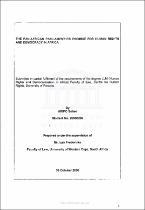| dc.description.abstract | Since the transition of the Organisation for African Unity (OAU) to the African Union (AU) there has been a notable shift in the way the organisation addresses human rights and democratisation. Particularly the OAU had been known for setting aside human rights concerns to the under resourced African Commission on Human and Peoples' Rights (African Commission) to deal with in Banjul, far away from Addis Ababa its major organs conduct their day to day activities.' However, the coming into force of the Constitutive Act of the AU and establishment of the Union had brought, at least in theory, human rights and democratic concerns to the centre. The Constitutive Act firmly and clearly provides as its objective the promotion of democratic principles and institutions, popular participation and good governance and promotion and protection of human rights in accordance with the African Charter on Human and Peoples' Rights (African Charter) and other relevant human rights instruments as provided for under articles 3(g) and 3(h) of the act. It further provides under article 4(m) respect for democratic principles, human right, rule of law and good governance as one of its principles. With the establishment of the AU and mainstreaming of human rights into the work of the AU, a myriad of institutions were created that deal with human rights. Coupled with this a very broad and rather general mandate was given to these various institutions. This resulted in lack of clearly defined roles and responsibilities of these institutions in relation to the promotion and protection of human rights as well as their contribution to democratisation. This in addition to posing a challenge to the aspiration of an integrated and effective approach to human rights leaves room for overlap, duplication of efforts and thus waste of already meagre resources. Unfortunately, four years since the inauguration of the AU in 2002 the roles and responsibilities of some of the major bodies tasked with promotion of human rights and democratic institutions are yet to be defined. One such institution is the Pan African Parliament (PAP). PAP owes it conception as far back as the Treaty Establishing the African Economic Community (AEC or Abuja Treaty) of 3 June 1991. The Sirte Declaration of 1999 called for the establishment of the AU and also provided for the shortening of implementation of the Abuja Treaty and the immediate establishment of institutions under the Africa Economic Community (AEC) one of which was PAP.2 PAP was finally established as an organ of the AU under article 5(c) and article 17 of the Constitutive Act. These provisions were further supplemented by a Protocol to the Treaty Establishing the African Economic Community relating to the Pan-African Parliament (Protocol establishing PAP), which was adopted in 2001 and came into force in 2003. One of its objectives, as set out in the Protocol, relates to the promotion of the principles of human rights and democracy in Africa (Art 3(2)). However since its establishment it is unclear as to how it has been carrying out this mandate and how it intends to do so in the future. | en_US |

